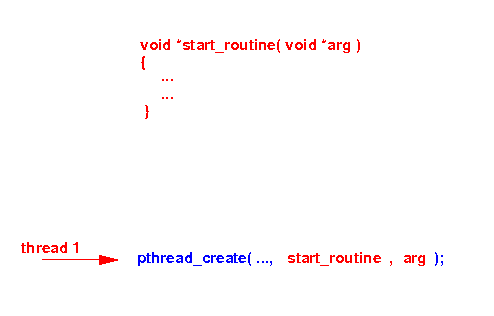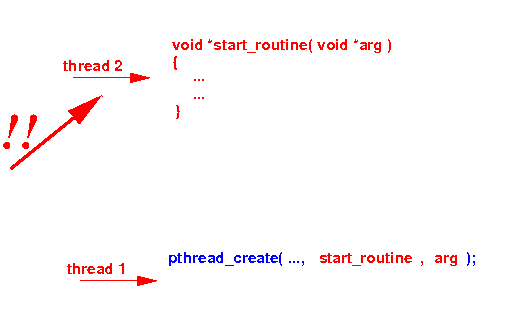- Syntax:
int pthread_create(pthread_t *threadID, const pthread_attr_t *attr, void *(*start_routine)(void*), void *arg);
Input Parameters:
-
attr =
contains the attributes (properties)
of the new thread
- Thread attributes are discussed later
- start_routine =
name of the
function that
the new thread will
execute
- This function has
one parameter
of the type (void *)
- The return value type of
this function is
void *
I.e.:
void * start_routine( void * arg ) { .... }
- This function has
one parameter
of the type (void *)
- arg =
the argument
that will be passed
to the start_routine
function when it
executes
Output parameters
- threadID =
the identifier of the
new thread
- We will use the threadID to wait for the thread to finish
Return value:
- Returns 0 if
thread is
created successfully
- Otherwise, returns an error code
-
attr =
contains the attributes (properties)
of the new thread
- Effect of
the pthread_create(..., start_routine, ...)
call:
- Before the
pthread_create( ) call:

Thread 1 is executing the pthread_create( ) call
- After the
pthread_create( ) call:

Thread 1 will continue execution the statements after the pthread_create( ) call
A new thread Thread 2 will start its execution with the function start_routine
- Before the
pthread_create( ) call:
- The attributes for a newly created thread is defined by
the user using a special bit-variable
of the type "pthread_attr_t".
The following definition will define one such variable; and the name of our variable is "attr" (you can call the variable any name that you like):
pthread_attr_t attr;
- Once such "pthread_attr_t" variable is defined,
you must first reset all properties to their
default values
using the function "pthread_attr_init()":
pthread_attr_init(&attr);
- The following is a list of "thread attributes" and
their default values
Attribute Default Meaning of default contentionscope PTHREAD_SCOPE_PROCESS Thread will compete for resources within the process detachstate PTHREAD_CREATE_JOINABLE Thread is joinable by other threads stackaddr NULL Workspace (stack) used by thread is allocated (reserved) by the operating system stacksize NULL Workspace size used by thread is determined by the operating system priority 0 Priority of the thread (the lower the priority value, the higher the priority...) policy SCHED_OTHER The scheduling policy is determined by the system inheritsched PTHREAD_EXPLICIT_SCHED scheduling policy and parameters are not inherited but explicitly defined by the attribute object guardsize PAGESIZE size of guard area for a thread's created stack (this area will help determine if the thread has exceeded the total amount of space that was allocated for the thread)
- Changing the default values:
-
There is no need
to change MOST of the default values
(In fact, my examples always use the default values)
- If you have the need to change some value,
you must invoke
specific functions to
set parameters
in the attr variable (after clearing the bits):
- pthread_attr_setscope(): change contentionscope
- pthread_attr_setdetachstate(): change detachstate
- pthread_attr_setstackaddr(): pick your own stack location
- pthread_attr_setstacksize(): pick your own stack size
- .. etc
- See: man pthread_attr_init for more functions.
- See: man pthread_attr_setscope for more details on the pthread_attr_setscope function, etc.
- Example: Changing the default STACKSIZE
- The only default value that you would
ever feel the need to change is: stacksize
The stack is used to store:
- local variables
- parameter variables
- You will need to increase the stack size
if the function
run by a thread uses:
- many local variables
- is recursive (because the function will create multiple copies of parameter and local variables !!!)
- many local variables
- How to set your own stacksize (workspace size) for your threads:
int pthread_attr_setstacksize(pthread_attr_t *attr, size_t stacksize);
Example: pthread_attr_t attr; pthread_attr_init(&attr); pthread_attr_setstacksize(&attr, 10000000); // 10000000 bytes stack
- The only default value that you would
ever feel the need to change is: stacksize
-
There is no need
to change MOST of the default values
- The following code fragment summarizes how to create a thread:
pthread_t TID; /* Thread ID - used for signaling */ pthread_attr_t attr; /* Thread attribute values for creation */ int param; /* --------------------------------------------------- Clear out thread attributes (use default values) --------------------------------------------------- */ if (pthread_attr_init(&attr) != 0) { perror("Problem: pthread_attr_init"); exit(1); } /* --------------------------------------------------------- Optionally, set thread attributes if needed (often not) --------------------------------------------------------- */ if ( pthread_attr_setstacksize(&attr, 10000000) != 0) { perror("Problem: pthread_attr_setstacksize"); exit(1); } param = some value....; /* -------------------------------------------------------------- Create thread (once created, thread starts running my_proc() Note: the C operator & means: address of ... -------------------------------------------------------------- */ if (pthread_create(& TID, & attr, my_proc, & param) != 0) { perror("Problem: pthread_create"); exit(1); }We must also provide a function for the thread to execute: void *my_proc((void *) x) <---- new thread will begin { execution with this function .... }
- Program:
#include <pthread.h> /* ================================== Thread prints "Hello World" ================================== */ void *worker(void *arg) { cout << "Hello World !" << endl; return(NULL); /* Thread exits (dies) */ } /* ================================================= MAIN: create a trhead and wait for it to finish ================================================= */ int main(int argc, char *argv[]) { pthread_t tid; /* --------------------- Create threads (Use default thread attribute values) --------------------- */ if ( pthread_create(&tid, NULL, worker, NULL) ) { cout << "Cannot create thread" << endl; exit(1); } cout << "Main waits for thread to finish...." << endl ; pthread_join(tid, NULL); exit(0); }
- Example Program:
(Demo above code)

- Prog file: click here
How to run the program:
- Right click on link and
save in a scratch directory
- To compile: gcc -pthread HelloWorld.c
- To run: ./a.out